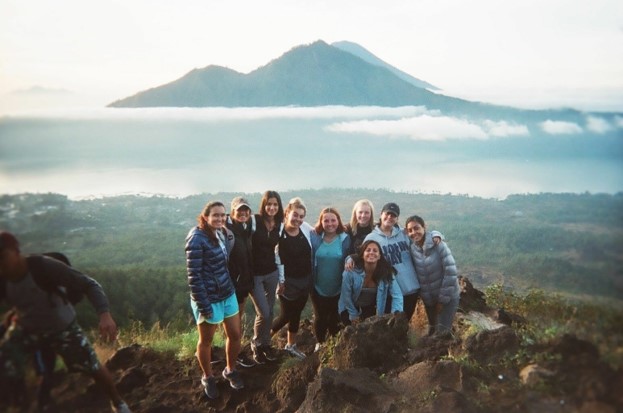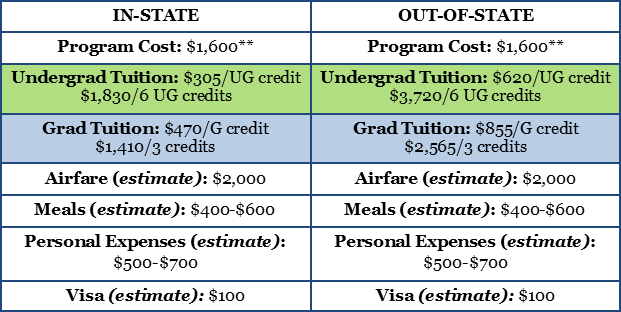Bali, Indonesia
Religion, Deviance, and Social Control: A Comparative Focus on Bali
Bali, Indonesia
Summer 2024: June 22 - July 21*
*dates subject to change

Program Description
This program takes place in Ubud, Bali, which provides a good point of contrast to the United States for understanding complexities related to religion, society, and deviance. Drawing on examples from the Balinese contexts, trips to relevant sites, and lectures by guest speakers, students will learn to apply their understanding of deviance and social control to North American and Balinese contexts.
Students from all majors are encouraged to apply.
Information Sessions
Information sessions will be held from 1:40-2:55 (community hour), via Zoom. Click HERE to join.
- Thursday, February 29
- Thursday, March 7*
- Monday, March 25
*March 7 info session will also be in-person in the conference room on the 5th floor of Haaren Hall, room 531
Undergraduate Courses
SOC 240: Deviance and Conformity (3 credits)
In this course undergraduate students will develop a theoretical understanding of deviance and social control and apply it to the North American and Southeast Asian contexts. We will discuss sociological theories of deviance and how these theories are relevant across these regions. Religion often forms the basis of social rules. Students will learn how different belief systems (e.g., monotheistic vs. polytheistic religions) contribute to rules that ultimately inform norms and laws.
SOC 386: Special Topics: Bali through a Sociological Lens (3 credits)
In this special topic’s class, referred to as "Bali through a Sociological Lens," students will use a sociological perspective to understand the culture and structure of Balinese society and to make cross-national comparisons. Students will examine the religious and historical culture and economic, legal, and political structure of this small island.
Undergraduate students are required to take both classes as part of this study-abroad program for a total of 6 credits.
Graduate Course
CRJ 769: Deviant Behavior (3 credits)
This MA-level course will help students develop a theoretical understanding of deviance and social control and apply it to the Southeast Asian context. We will discuss sociological theories of deviance and differences in how these theories might be applied in North America vs. Southeast Asia. Religion often forms the basis of social rules. Students will learn how different belief systems (e.g., monotheistic vs. polytheistic religions) contribute to rules that ultimately inform norms, laws, and policing. We will also examine how different societies respond to deviance, discussing labeling and social reaction theories. Students will gain an understanding of deviant subcultures and how they may be similar or different in the American and Balinese contexts. Students will also learn about the different definitions of and ways to measure deviance.
Prerequisites
- Minimum 2.5 GPA
- If graduate student, good standing in a Master’s program
Application
You can access and start your application here.
Application Deadline: Extended to Monday, April 8
However, qualified applicants will be admitted on a rolling basis until places are filled. Thus, due to limited places, students are encouraged to apply early.
Please note: An application fee of $50.00 is due at the time of application. It can be paid by debit or credit card. Money orders, personal checks and cash are also accepted. Applications will not be accepted if incomplete.
Program Cost
Estimated Program Fee: $1,600**
**Subject to change. Includes double-occupancy hotel accommodations, some meals, international health insurance, excursions and transportation on-site associated with program. Does not include tuition, airfare, some meals, visa, personal expenses & excursions, etc.

John Jay College Tuition and Fees
Undergraduate Tuition and Fees
Financial Aid & Scholarships
Students should make an appointment with the Financial Aid Office, at their home College, to discuss the applicability of their financial aid to this program.
More information on scholarships and funding can be found on our Study Abroad Funding page.
JJC students can contact Michael Scaduto for more information regarding the JJSAS, and general scholarship opportunities, at 212-237-8872 or email at mscaduto@jjay.cuny.edu.
Program Notes
- Housing: Students will stay in double-occupancy accommodations.
- Fluctuating exchange rates and other fees may lead to program cost changes.
- Program cost is based on a minimum number of participants for the program.
- Students should discuss applicability of financial aid with the Financial Aid office.
- All CUNY students must meet with their study abroad advisor to be sure the proper e-Permit registration process is followed.
- All non-CUNY students are encouraged to apply early, to be sure there is ample time to apply and register for classes at John Jay College. Please contact OISP for more information regarding the application process. Please note: Tuition rate per credit is different for non-CUNY students. More tuition information can be found here.
Image

Photo by: Lissette Zayas
Summer 2016 - Refund Policy: Payment of the program deposit indicates the student understands and agrees to the Office of International Studies & Program’s payment and refund policies. Students who withdraw from a John Jay College program after confirming participation, but before the program begins, will lose the non-refundable deposit and any unrecoverable costs: students will be refunded 50 percent of program fees 30 days prior to the program start date, and 25 percent of program fees 14 days prior to the program start date. After the start of the program, no refunds will be provided, and the student is responsible for all program fees. If the program fee is not paid in full, there will be a hold placed on her/his CUNYfirst account.
- For faculty-led programs, tuition refunds will be granted following the College’s policies. For more information, click here.
- College-based funders retain the right to recoup funds from the student account if the student does not follow rules of the CUNY Travel Waiver & Release Form, uses the funds for other purposes, or withdraws from the program. Students must understand that they are responsible for full payment of the amount owed to the department.
- The Office of International Studies and Programs (OISP) has the right to modify or cancel the program, including changes to the program dates, costs, scheduled visits, program itinerary, etc., as dictated by economic and/or political situations, etc.
- Students are responsible for purchasing their own airfare, and for their itinerary. Due to possible changes in program dates/itinerary information, students are not to purchase airfare until prompted by OISP.
- Students are encouraged to apply early, due to limited space.
- Information is tentative, and subject to change, **program cost(s), syllabi, *dates, etc.
Health Information for Travelers to Indonesia
It is important to be aware of the health information provided by the US Center for Disease Control and Prevention. All vaccines should be up to date, and it is important to check the vaccines and medicines list and visit your doctor (ideally, 4-6 weeks) before your trip to get vaccines or medicines you may need. Ask your doctor what vaccines and medicines you need based on where you are going, how long you are staying, what you will be doing, and if you are traveling from a country other than the US.
More information can be found on the Center for Disease Control website. All travelers should be up to date on routine vaccinations while traveling to any destination. Some vaccines may also be required for travel.
| Routine vaccines | Make sure you are up-to-date on routine vaccines before every trip. These vaccines include measles-mumps-rubella (MMR) vaccine, diphtheria-tetanus-pertussis vaccine, varicella (chickenpox) vaccine, polio vaccine, and your yearly flu shot. |
Please note that most travelers:
Get travel vaccines and medicines because there is a risk of these diseases in the country you are visiting.
| Hepatitis A | CDC recommends this vaccine because you can get hepatitis A through contaminated food or water in Indonesia, regardless of where you are eating or staying. |
| Typhoid | You can get typhoid through contaminated food or water in Indonesia. CDC recommends this vaccine for most travelers, especially if you are staying with friends or relatives, visiting smaller cities or rural areas, or if you are an adventurous eater. |
For More Information
Prof. Amy Adamczyk, Department of Sociology (Academic Inquiries)
adamczykamy@gmail.com
Ken Yanes, Dep. Director
212-484-1339, kyanes@jjay.cuny.edu
Daniel Braslavsky, Study Abroad Coordinator
212-887-6105, dbraslavsky@jjay.cuny.edu
studyabroad@jjay.cuny.edu
212-484-1390
Office Location & Mailing Address:
Office of International Studies & Programs
John Jay College, CUNY
524 West 59th Street
Haaren Hall, Suite 530
New York, NY 10019 USA